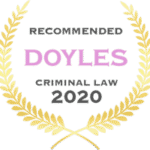Sydney Criminal Lawyers
Being charged with or investigated in relation to a criminal offence can be intimidating. Our Sydney Criminal Lawyers have your best interests at the front of their mind and will explain each stage of the legal process to you. It’s essential you have representation and talk to a lawyer before you speak to the police. Anything you say to the Ppolice can be used as evidence against you.
Our Sydney Criminal lawyers attend the Local Court and District Court on a regular basis. They know what to say to the police and they know what to say, how to act and what to expect in court.
They will assist with navigating your way through the criminal justice system and will fight for the best outcome for you.
Armstrong Legal’s Sydney Criminal lawyers will gather all the necessary information about the allegations against you and about your circumstances and advise you on how you should plead.
Our lawyers know that a criminal conviction can have a devastating and long-lasting impact on your future and can potentially affect your travel plans and employment opportunities.






Drugs and violent crime in Sydney
There is a significant link between drugs and violent crime in Sydney with a third of assaults being alcohol related. 50% of all alcohol related assaults happen between 6pm and 12am and a further 33% occur between 12am and 6am according to statistics published by the NSW Bureau of Crime Statistics and Research. (BOSCAR).
Since the lockout laws were introduced in February 2014 in response to the deaths of two young men, Daniel Christie and Thomas Kelly while out in King’s Cross, assaults in the lockout areas have significantly decreased.
Drug use increases the risks of violence, both in respect of becoming a victim and becoming a perpetratore. Different drugs have different effects which may increase the likelihood of a person carrying out a violent offence. In 2006, BOSCAR published a report linking violent behaviour and the use of methamphetamine because it alters the brain’s neurochemical systems. Methamphetamine increases aggression because of a reduction in serotonin levels.
If you’ve been charged with an offence it’s worthwhile to chat to one of our Sydney Criminal lawyers who can give you advice and negotiate a good outcome on your behalf. This may include a Section 10 dismissal, or a Community Corrections Order.
If it is your first offence, our Sydney Criminal lawyers are in a better position to negotiate a lesser penalty, than if it was a subsequent offence.
Defending professionals and high-profile individuals
At Armstrong Legal our Sydney Criminal lawyers only practice in their area of expertise so you can trust that you have the best representation for your matter.
We will always treat your matter in the strictest confidence and will never publicise your identity or details of the allegations against you.
Our lawyers have defended professionals and high-profile individuals with favourable outcomes.
They have had previous success in plea negotiations and convinced the prosecution to drop a charge in favour of a similar, but lesser offence for example the charge of manslaughter dropped in favour of a charge of Grievous Bodily Harm (GBH) or Dangerous driving causing death.
Contact the Sydney Criminal Law team!
Taking the next step and contacting a lawyer can be scary. Our lawyers will make you feel comfortable so you can talk about your situation.
Warrants
In New South Wales there are two types of warrants that can be issued: warrants for arrest and search warrants.
Warrant for Arrest
A warrant for arrest is an order made by a judicial officer such as a registrar, Magistrate or Judge. It gives the police the power to arrest and detain the person named on the warrant in order to bring them before the courts. Several types of arrest warrants may be issued depending on the stage of police prosecution and court proceedings.
A pre-court warrant for arrest
A pre-court warrant for arrest may be issued if police are unable to locate a suspect for the purpose of formally charging them.
A warrant for arrest for failing to appear in court
If you fail to appear in court a Magistrate or Judge may issue a warrant for your arrest. Failure to appear in court can occur on the first court date or any other date where you were scheduled to appear in court.
A warrant for arrest for breaching bond or another sentence
A Magistrate or Judge can issue a warrant for your arrest if you breach a good behaviour bond or other conditions of your sentence.
Warrant for arrest related to ADVO or APVO proceedings
This warrant can be issued if the court believes it is necessary to bring the defendant in ADVO or APVO proceedings to court.
Warrant for arrest related to correction of sentence
This warrant can be issued if there has been an error in a sentence that needs to be corrected in the presence of the defendant.
Warrant for the arrest of witness in proceedings
A warrant may be issued if a person was subpoenaed and failed to appear in court as a witness.
If you are worried there may be a warrant out for your arrest you should call a Sydney Criminal lawyer immediately on 1300 038 223.
Search warrants
A search warrant gives the police the right to enter a person’s premises to investigate criminal matters. Police cannot search your property without a search warrant. When the NSW Police have a search warrant, they can search anyone at the property, not just those named on the search warrant.
Contact the Sydney Criminal Law team!
Taking the next step and contacting a lawyer can be scary. Our lawyers will make you feel comfortable so you can talk about your situation.
Information on being granted bail in Sydney
When a person is charged with a criminal offence in New South Wales, police may grant them bail or they may have to apply for bail in a court. To be granted bail, a person must show the courts that the associated risks can be reduced with the imposition of bail conditions.
Armstrong Legal’s Sydney Criminal lawyers can negotiate with the prosecution on your behalf to ensure you have the best chance of remaining in the community until your matter is finalised.
To be granted bail in Sydney you must:
- Surrender your passport.
- Report to the police at certain times.
- Adhere to a curfew and be at a specific address at certain times.
- Reside at a specific address.
- Not go to certain places.
- Not contact certain persons
- Appear in court on a specific date.
In some cases the court will ask for a bail surety which is an amount of money that the person applying for bail or another person (usually a family member) will forfeit if you do not adhere to your bail conditions.
The person who provides the bail surety must also provide a written statement that they believe the accused person is responsible and will comply with their bail conditions.
Bail refusal
The courts will refuse bail where the applicant has committed a “show cause” offence unless the accused can provide the court with a valid reason or reasons why their detention isn’t justified.
The courts must refuse bail if they think there is an unacceptable risk to the public.
If a person has been refused bail they can only apply for bail again in the following circumstances:
- if they did not have legal representation the first time they applied;
- circumstances have changed; or
- they are under the age of 18 and the most recent bail application was submitted on their first appearance for the offence.
Breaching bail in Sydney
If you are convicted of an offence and released on bail; and then breach your bail conditions, the court may warn you against committing any further offences. Sometimes though, it may revoke your bail; in which case you will forfeit any bail surety that was paid.
If you commit another offence while you are on bail then the courts must revoke your bail unless you “show cause” why it should not do so. The court may also hand down a harsher penalty for the subsequent offence because you have breached the trust the courts placed in you.
If you are convicted for breaching bail, the offence will be added to your criminal record.
Contact one of our Sydney Criminal lawyers if you would like guidance on completing a bail application, advice on bail condition breaches or if you are being charged with a “show cause” offence..
How our Sydney Criminal Lawyers can help
Our Sydney Criminal lawyers are well informed and experienced in their area of practice so you can trust their advice.
If you’d like help, give them a call on 1300 038 223.


